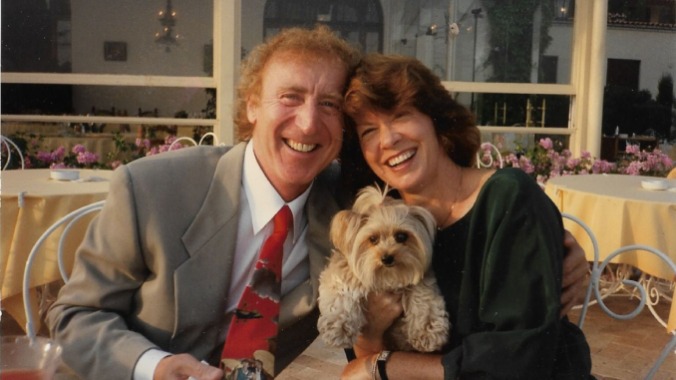Remembering Gene Wilder Simply Pays Its Respects to a Complex Artist

Gene Wilder’s piercing, glassy blue stare is the first image we are greeted with in Ron Frank’s Remembering Gene Wilder. It is the most iconic moment from his iconic career: Willy Wonka, clad in his purple suit, with the delicate melody of “Pure Imagination” ringing out. For an actor known for his frantic, zany delivery, it is a starkly reserved introduction, capturing an enthralling, strategic stillness that explains Wilder’s genre-defining success. Frank uses his documentary as a hypothesis, making a case for the alluring blend of dramatic and comedic talent that elevated Wilder, endeavoring to expose the effort behind his kind of effortlessness. If only the mode of expression were as unpredictable as the talent himself.
Documentaries covering an artist’s life are subject to a few set conventions, the narrative bound by photos that range from grainy black-and-white to more recent digital snapshots, while the subject’s friends and family spout stories as a range of talking heads. First-person B-roll and secondary opinions blend to form a familiar tapestry of unfamiliar perspectives. But this texture is complicated by the decision to hold the story together with Wilder’s real voice, as recorded through the audiobook of his memoir Kiss Me Like a Stranger: My Search for Love and Art. It is a surprising decision, one that intriguingly negotiates the ethics of documentary-making. Rather than prying into the psyche of a complicated man, Remembering Gene Wilder tries to let the subject “remember” for himself.
This choice proves to be a double-edged sword, impeding and propelling the story. It lends the film a gentle tone, as honest and earnest as the man himself, but also a certain staleness—the movie becomes locked, incomplete and in the past. There is not much space for reinterpretation, with the story frequently grinding to a stuttering halt. Frank marries this voiceover to movie clips we’ve already seen and highly posed, “behind the scenes” photos, inadvertently constructing a stylized stillness.
Fortunately, Mel Brooks (Wilder’s close friend and frequent collaborator) lends the film bouts of welcome momentum and legitimacy. Brooks is a famously witty storyteller, and as the only witness still alive to testify to this juncture in Wilder’s career, he is a crucial resource. This first sequence is located in the Martin Beck Theatre where Wilder co-starred with Anne Bancroft in a production of Mother Courage and Her Children. Eventually she introduced him to her partner, Brooks, and so began an illustrious moviemaking pair.
-

-

-

-

-

-

-

-

-

-

-

-

-

-

-

-

-

-

-

-

-

-

-

-

-

-

-

-

-

-

-

-

-

-

-

-

-

-

-

-








































